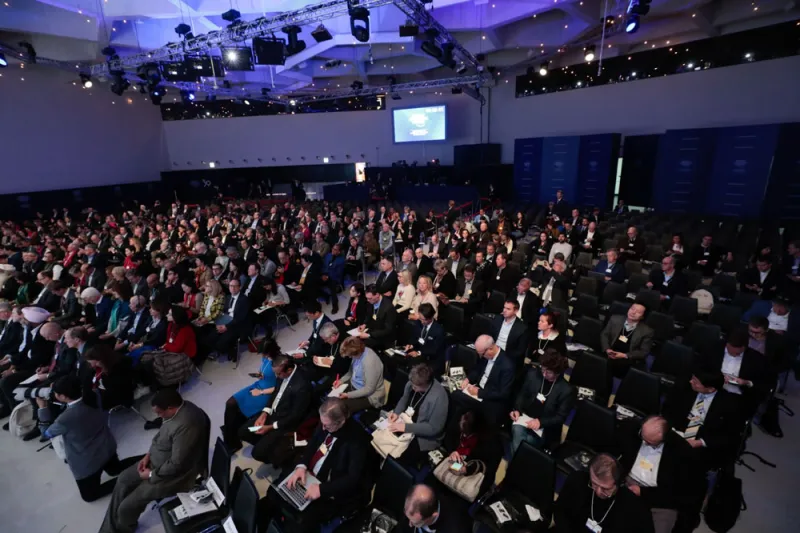Long-distance investing is about as satisfying as long-distance romance, it turns out.
“We have our regular CIO lunch on Fridays every month, and we just tried to do it with 12 people on a Zoom call,” said Mark Baumgartner, chief investment officer of the Institute for Advanced Study, and a well-known leader in the NYC allocator scene. “The men were all shaved; women were all put together. There’s nothing like getting front of your peers to make you step it up a notch.”
Anyone who’s responsible for a billion dollars could fill their calendar with nothing but investment events, if they so choose. Too many invitations become their own grind. Now, of course, institutional investors aren’t invited anywhere. No conferences, no annual meetings, just quality time with the laptop or Bloomberg terminal.
For all the upbeat talk of a “new normal” — leaner travel, remote teams — investment executives just want the old normal back.
“It was fine,” Baumgartner told Institutional Investor of his livestreamed luncheon. “But it was not the same. The novelty will wear off pretty quickly.”
Senior allocators, money managers, and service providers had remarkably consistent views about returning to face-to-face work after the pandemic. First, they foresee a social un-distancing process — whenever that starts — that’s more gradual and individual than the lockdown was. Empathy will matter.
“We will have to be very sensitive to the fact that some people will have different levels of comfort with things like shaking hands,” said PGIM’s Josh Cohen, normally a frequent traveler who works with big companies on their defined-contribution retirement plans. “I hope we can get to a place where we do that again.”
Cohen imagines his first trip will be to see some of PGIM’s best clients, with whom he has the closest relationships. “Those are the ones you want to consider honoring and fostering. Clients come first — even before events or prospects.”
PGIM has teams other than Cohen’s to run sales efforts, but to his knowledge, “discussions have accelerated” with prospective clients. Institutional-quality fund managers suggest that the market chaos will bring opportunity for new business, particularly among asset owners who went into the crisis with sub-par support.
For example, Alvarium — a high-net-worth manager and multi-family office spun out from Guggenheim Partners — is poised to mobilize when travel restrictions lift.
“I’m definitely looking forward to face-to-face contact with clients,” said Jose Remy, a Miami-based partner at Alvarium. “Once we get out of this crisis, it’ll be the same as in 2008 or 2001. When bad markets come around, people do see the need to have an unbiased advisor. We are getting ready to hit the road when travel restrictions are lifted. Because a lot of [other firm’s] clients out there had inappropriate portfolios, got really affected by the selloff, and are looking for sophisticated advice.”
[II Deep Dive: Dealmaking in a Pandemic]
For road warriors like Remy, staying home is simply against their nature. Pressing the (well-sanitized) flesh of a prospective client is what they do, part of who they are.
“I traveled a lot, and have clients mostly in Latin America and the U.S.,” Remy said. “I saw all of them quarterly. Since the first half of March, I haven’t traveled at all. God knows when I’ll be able to visit some of these clients again.”
The good news for Remy, Cohen, and other asset managers? Clients can hardly wait to see them, too.
The investment chief for New Mexico’s $26 billion wealth fund said his team will be back on the road “for sure” once it’s safe to hit the tarmac. “We get so much more out of face-to-face interaction,” Vince Smith, CIO at the New Mexico State Investment Council, told II. “Not that the Zooms and Skypes aren’t good enough to run our processes. But non-verbal communication is really important,” and screens filter out much of it.
“My first trip? Probably a conference,” Smith replied when asked. Working from home has, if anything, confirmed that his previous event calendar was just about right. As for next year, he anticipates “maybe a few more conferences and personal visits,” and doesn’t expect to change those trips to virtual encounters, unless he has to.
Baumgartner, CIO of the Institute for Advanced Study, is a tech enthusiast and open-minded to advancements. But the conference model isn’t broken, in his mind, and Zoom wouldn’t improve it anyway.
“I don’t think anybody would say a virtual meeting is as rich or effective as a conference,” Baumgartner observed. “I go to conferences and see people who live in the same town as me that I don’t see in New York. Time has been carved out for that purpose. It’s not the information gathering — I can watch a TED talk or a video replay of a panel, and get most of that aspect. What you can’t get is the interaction, the relationships, the trust building. The interesting thing will be how fast technology can bridge that richness gap.”
When they’re sprung from lockdown, perhaps he and Smith will run into each other at the next investment event. And shake hands.






